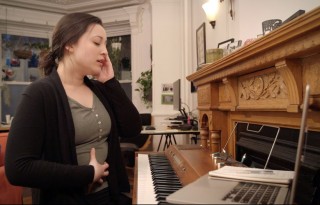Title

Conquering Performance Anxiety is one of the new Juilliard Open Classroom courses.
(Photo by Eric Mann/Unreel Films)A Juilliard education is by definition exclusive, but wouldn’t it be great if the general public could benefit from some of the vast quantity of expertise here? And what if that expertise could reach even beyond Juilliard’s 700-plus on-campus performances and more than 900 Evening Division students?
Body
Enter Juilliard Open Classroom. Through this initiative, which is being rolled out this spring, people of all levels, ages 13 and up, will be able to take a series of online courses that combine the latest in digital learning technology with Juilliard’s tradition of educational excellence.
“In the past, performing arts education was something that happened on college campuses, in private studios, or in concert halls,” Joseph W. Polisi, the president of Juilliard, said upon announcing the initiative, on March 7. “Without changing our on-campus curriculum, Open Classroom will allow us to expand the reach and impact of our educational programs, giving students of dance, drama, and music around the globe the opportunity to develop their craft and to understand the inner workings of great works of art under the guidance of some of the world’s greatest performing arts educators.”
This suite of online performing arts courses has been developed with edX, a leading nonprofit online learning company. The courses are taught by Juilliard faculty members and incorporate input from an array of pre-eminent artists and performing arts institutions as well as an innovative video-sharing platform that allows students to form interactive practice groups with their peers and receive personalized feedback from Juilliard course fellows.
Sharpen Your Piano Artistry is designed for advanced beginner- to intermediate-level pianists to improve their playing. Under the guidance of faculty member Michael Shinn (BM ’02, MM ’04, piano) and graduate-level Juilliard pianists, students will brush up on technique and, in the course of learning two classical pieces, be able to share weekly performance videos, get professional feedback on their progress, and finally create performance videos of the two pieces.
Conquering Performance Anxiety, taught by faculty member Noa Kageyama (MM ’00, violin), helps musicians at all levels learn and use techniques embraced by professional musicians and elite athletes to develop the psychological skills necessary to perform at their optimal level with confidence.
Steve Laitz, chair of the Juilliard’s music theory and analysis department, teaches Music Theory 101, which exposes students of all backgrounds to the fundamentals of music theory, including concepts such as pitch, tonality, mode, key, dissonance, rhythm, and meter.
How to Listen to Great Music for Orchestra is taught by music history faculty member Michael Griffel and features expert interviews and concert footage from the Berliner Philharmoniker. No previous knowledge is required, so anyone can learn to appreciate orchestral music without feeling intimidated. The focus is on five iconic works—Handel’s Water Music, Mozart’s Piano Concerto No. 9 in E-flat Major, Beethoven’s Ninth Symphony, Strauss’s Till Eulenspiegels lustige Streiche, and Bartók’s Concerto for Orchestra.
These classes are intended to reach non-Juilliard students, and while they can’t be taken for credit, students will receive a statement of accomplishment upon completion.




